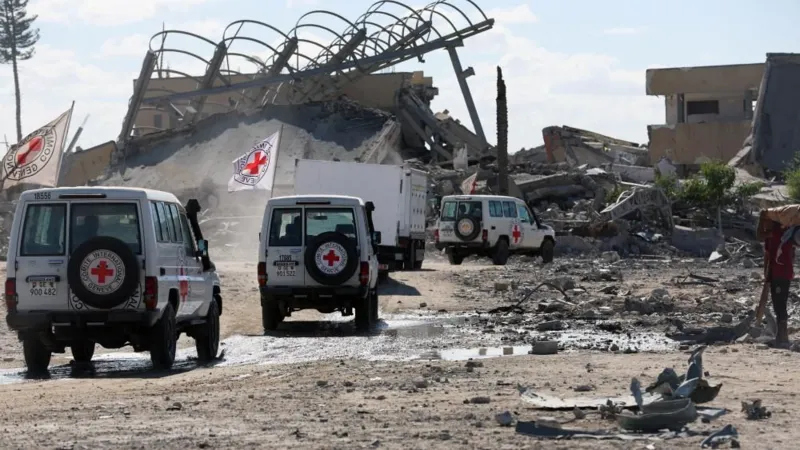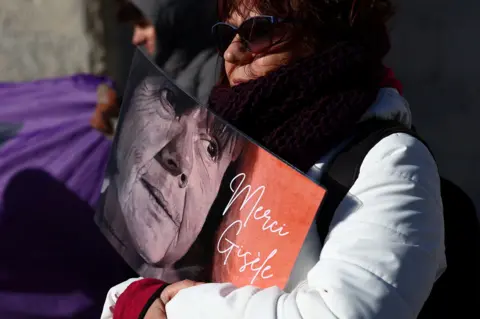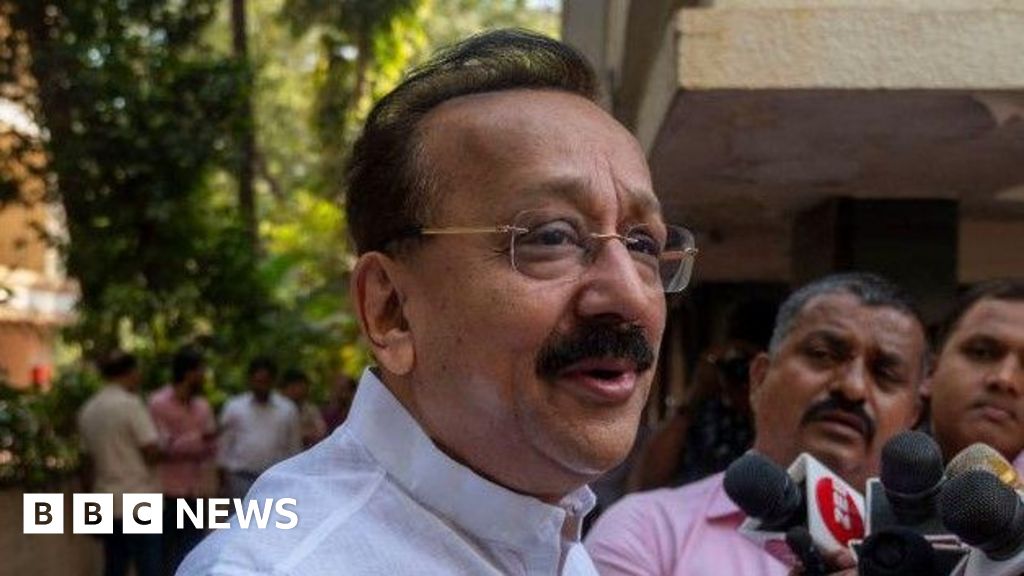Paulin Kola and
Chris Graham
Hamas has returned the bodies of four more deceased hostages, the Israel Defense Forces (IDF) has said, with identification work underway.
The Red Cross retrieved the remains in coffins and handed them over to the Israeli military late on Tuesday night.
The transfer came after Israel warned it would restrict aid into Gaza until Hamas returned the bodies of all 28 deceased hostages. The Palestinian armed group handed back 20 living and four deceased hostages on Monday.
The remains of 45 deceased Palestinians who had been held in Israel were returned to Gaza on Tuesday, the Red Cross said in a statement.
The first four deceased hostages released by Hamas on Monday have been identified by Israel as Daniel Peretz, 22; Yossi Sharabi, 53; Guy Illouz, 26 and Bipin Joshi, 23, a Nepalese national.
The Israel Defense Forces (IDF) office said the identification process for the latest four hostages was underway.
US President Donald Trump’s ceasefire plan, which both Israel and Hamas accepted, envisaged the handover of all 48 hostages would be completed by noon on Monday.
While all living hostages were returned, pressure is growing on Hamas and the Israeli government over the remains of 20 hostages which Hamas has not yet repatriated. Palestinians are increasingly worried that a delay in Hamas returning the bodies could bring uncertainty to the future of the ceasefire.
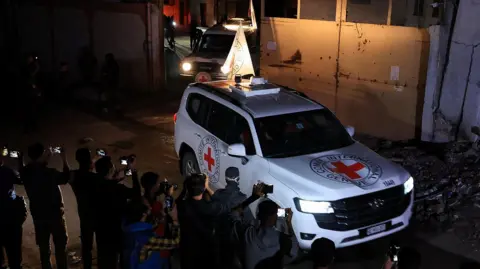 Reuters
ReutersIn a statement on Tuesday, the IDF said: “Hamas is required to fulfil its part of the agreement and make the necessary efforts to return all the hostages to their families and to proper burial.”
Israel’s defence minister has warned the Palestinian armed group that “any delay or deliberate avoidance will be considered a gross violation of the agreement and will be responded to accordingly”.
Israeli officials said they had decided to restrict aid and delay plans to open the Rafah border crossing with Egypt because Hamas had violated the ceasefire deal by failing to turn over bodies of hostages.
Hamas says it has had difficulty locating the dead hostages’ remains.
A copy of the ceasefire agreement, published by Israeli media last week, appeared to acknowledge that Hamas and other Palestinian factions might not be able to locate all of the bodies within the original timeframe.
An Israeli official has suggested that an international task force will start work to locate the remains of anyone who was not returned.
“A big burden has been lifted, but the job is NOT DONE. THE DEAD HAVE NOT BEEN RETURNED, AS PROMISED! Phase two begins right NOW!!!” Trump said on X.
Many Palestinians have told the BBC they are worried the delay in Hamas’ return of all bodies of Israeli hostages and the subsequent violence could risk the ceasefire and derail the start of the second phase of negotiations.
Tayseer Abed, a well-known Gaza writer who has chronicled the war from his tent in Khan Younis, described the standoff as “a dangerous test for the ceasefire”, warning that if the delay continued and Israel refused to move to the next phase, “the corpses issue could become the fuse that ignites a new round of conflict”.
Almost 2,000 Palestinian prisoners and detainees were released as part of the 20-point peace plan, touted by the US president as the end of the two-year war.
The first phase of Trump’s plan saw the ceasefire come into effect at 12:00 (09:00 GMT) on 10 October.
Israeli Prime Minister Benjamin Netanyahu told CBS, the BBC’s US partner, that he remained hopeful for a peaceful next phase in the talks between Israel and Hamas.
But he said Trump’s conditions were “very clear” that Hamas must demilitarise or “all hell breaks loose”.
“First, Hamas has to give up its arms,” Netanyahu said. “And second, you want to make sure that there are no weapons factories inside Gaza. There’s no smuggling of weapons into Gaza. That’s demilitarisation.”
Trump also added pressure on Hamas to give up arms. “They’re going to disarm, because they said they would disarm. And if they don’t disarm, we will disarm them,” the US president said.
While the ceasefire has largely held, Palestinian Civil Defence told the BBC that seven people were killed by Israeli forces on Tuesday in two separate incidents – in eastern Gaza and to the east of Khan Younis.
An Israeli drone strike in Gaza’s eastern Shejaiya neighbourhood killed five people, says Wafa news agency, which quoted a medical source saying “Israeli drones fired at residents inspecting their homes”. The Israeli military said it fired after people crossed the yellow line, where its troops have withdrawn to under Trump’s ceasefire plan.
Meanwhile, Hamas fighters demonstrated they were reasserting control in Gaza, with reports of masked gunmen executing eight Palestinians in public triggering fear and outrage among residents.
While Hamas maintains that its fighters are working to “restore security” and “eliminate lawlessness,” many fear the group is using the chaos to settle scores with rivals and silence critics.
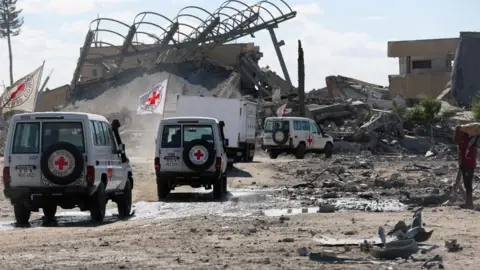 Reuters
ReutersTrump signed the declaration on Monday, alongside the leaders of Egypt and Qatar – the main mediators – and Turkey, which played a significant role in the latter stages of indirect negotiations between Israel and Hamas.
UK Prime Minister Sir Keir Starmer and French President Emmanuel Macron were among more than 20 world leaders attending – including many from Muslim and Arab countries. Netanyahu and Hamas did not take part.
The plan would see Gaza initially governed by a transitional committee of Palestinian technocrats overseen by the “Board of Peace”, before power is eventually transferred to the Palestinian Authority once it has undergone reforms.
But difficult negotiations will be needed in order to move forward with the latter phases of the plan.
Among the points of contention are the extent and timeline of Israeli troop withdrawal, the disarmament of Hamas, and the future governance of the Gaza Strip.
Hamas has previously said it will not disarm unless a Palestinian state was established – and has rejected the idea of foreign governance in Gaza.
The Israeli military launched a campaign in Gaza in response to the Hamas-led attack on southern Israel on 7 October 2023, in which about 1,200 people were killed and 251 others were taken hostage.
At least 67,869 people have been killed by Israeli military operations in Gaza since then, according to the territory’s Hamas-run health ministry.
